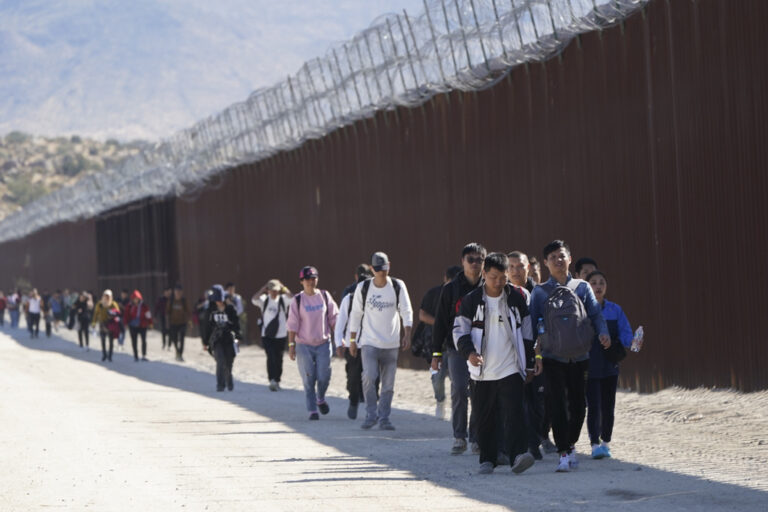Beijing and Washington have quietly resumed cooperation on the deportation of Chinese immigrants who are in the U.S. illegally, as the two countries are reestablishing and widening contacts following their leaders’ meeting in California late last year.
After China suspended cooperation in August 2022, the United States saw a drastic surge in the number of Chinese immigrants entering the country illegally from Mexico. U.S. border officials arrested more than 37,000 Chinese nationals on the southern border in 2023, 10 times the number during the previous year, further exacerbating tensions over immigration going into the presidential election.
In a statement sent to The Associated Press this week, the Chinese foreign ministry said Beijing was “willing to maintain dialogue and cooperation in the area of immigration enforcement with the U.S.” and would accept the deportation of those whose Chinese nationality has been verified.
Homeland Security Secretary Alejandro Mayorkas last month told the U.S. House during a budget hearing that he had “an engagement” with his Chinese counterpart to ensure that China would begin to accept removal flights so “we can deliver a consequence” for Chinese immigrants who do not have a legal basis to remain in the U.S.
Mayorkas also said there was one deportation flight to China, for “the first time in a number of years.”
U.S. Immigration and Customs Enforcement did not respond to an AP request for details on the cooperation and the number of Chinese nationals who have been deported or await deportation. Without cooperation from the Chinese government, the U.S. cannot send back Chinese immigrants who have no legal status to stay in the country.
It is unclear when cooperation resumed, but a charter flight carrying a small but unknown number of deportees landed in the northeastern Chinese city of Shenyang on March 30, according to Thomas Cartwright of Witness at the Border, an advocacy group that tracks deportation flights. The group has not detected other flights to China, but it’s possible that some immigrants could have been deported on commercial flights, Cartwright said.
The number of Chinese deportees was certainly small on the March 30 flight because the Gulfstream V, which took off from Arizona and stopped in Texas and Alaska before reaching China, typically has a seating capacity of 14. It also made a stop in South Korea before heading back to the U.S., according to Cartwright.
But it was a sign that Beijing and Washington are once again cooperating on deportation, after the Chinese government stopped the cooperation in response to a visit by Nancy Pelosi, then the House speaker, to Taiwan. Beijing claims sovereignty over the island and strongly opposes any official contact between the island and the U.S.
Beijing also halted high-level military-to-military dialogue, cooperation on anti-narcotics and talks on climate change, plunging relations to a low.
It wasn’t until November 2023 when President Joe Biden hosted Chinese President Xi Jinping in Woodside, California, that the two sides agreed to restart the military-to-military talks and cooperation in fighting fentanyl. Dialogue on climate change had resumed before then.
In April, Deputy Secretary of State Kurt Campbell complained that Beijing was doing little to curb the outflow of Chinese migrants. Beijing countered that it “firmly opposes any form of illegal immigration and severely cracks down on all forms of illegal immigration organizations.”
The number of Chinese migrants arrested by the U.S. border patrol peaked in December but it showed a downward trend in the first three months of 2024.
(AP)











